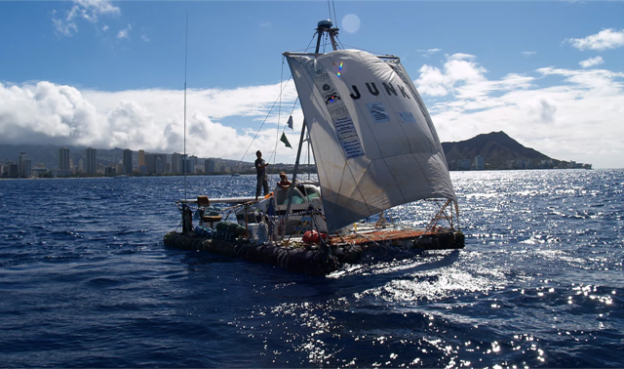A Reflective Response to “Junk Raft”
Nature produces vast quantities of “waste.” But what is “waste” for one organism or species is, or becomes, food for another. Nature’s economy is cyclical. And because it is constantly supported by incoming energy from the sun, the biosphere grows in richness and complexity.
If we compare this with the modern human economy, the contrast is stark. In the case of prehistorical, hunting and gathering societies, there is already a difference, but it is not yet “stark.” To a large extent their economy was also cyclical. But very early humans used their intelligence to free themselves from the constraints of the cyclical economy. Whereas natural systems normally enrich the soil, human grazing of livestock and monocultures of crops, typically impoverished the soil.
Human cultures differed greatly in this respect. Some developed methods that were sustainable, or almost so. Using human feces to fertilize rice paddies, for example, approximated the circularity of nature. Elsewhere, we find the ruins of ancient civilizations whose systems exhausted the productivity of the soil. In most instances the people could move and begin the process again.
The full contrast awaited modernity and the industrial revolution. All the living products of nature die, and if they do not immediately supply food for others, they decay until they do. But human artifice can turn living things into products that endure for long periods with very little decay. And even when they decay they may contribute nothing to the biosphere. In other words, our waste contains much that is truly and utterly waste. Plastics are a clear example. They show, with full clarity, that our economy is unsustainable.

Plastics play a large and growing role in the human economy. Humans measure their economy by the amount it produces without regard to what happens to that product. So, measured by these human standards, the production of plastic is pure gain. The whole system depends on having more and more consumers consuming more and more. Consumers are attracted to what is cheap and trouble free. Since throwing something away is less trouble than cleaning and reusing it, and since our society has organized itself so as to make the disposal of this waste easy and inexpensive for the consumer, plastics are very popular.
Gradually we consumers are becoming aware that what is so cheap and easy for us individually is immensely costly and difficult to deal with collectively. A few of us, dramatically reduce our use of plastics, but this complicates life, costing both time and money. The vast majority of us adapt our lives to the “throughput” society and think very little about what happens to the increasing waste. Even when we learn the facts, we do not really feel them. So we turn attention elsewhere and adapt to the unsustainable world.
Marcus Eriksen and his friends know these facts far better than the rest of us. But they also know that simply informing us will do little to change our behavior. If we are to be redirected away from our suicidal behavior, we must be grasped by images. These must hold our attention long enough to sink in and affect the sensibility that largely governs our behavior.
Eriksen cares enough about effecting this change to make his life a powerful symbol. He not only sails the seas to tell us about the ever-increasing consequences of our refusal to learn from nature, but he creates a raft made of junk and travels in that. Then he uses his remarkable gifts in writing to share his adventure while teaching us the facts we need to know. He invites us to join in our own way in the task of bringing the human economy into the cyclical form that nature requires.
The human adventure with an artificial economy that ignores nature’s requirements is nearing an end. There is grave danger that its end will be the end of civilization as well. But Eriksen calls us to make it an end constructed by the intelligence that is now still leading us to destruction. It is still possible to learn and repent and reconstruct. From aboard his Junk Raft Eriksen points the way, offers the images, and appeals to our spirit of adventure. May we respond and join in this truly important adventure.
Purchase Marcus Eriksen’s excellent and timely text, Junk Raft: An Ocean Voyage and a Rising Tide of Activism to Fight Plastic Pollution, from the Pando Populus bookstore.

